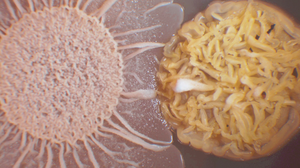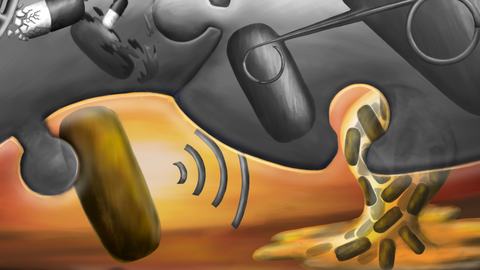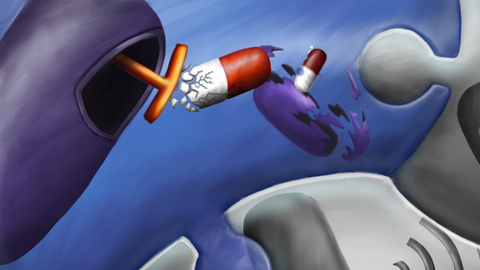Forschungsschwerpunkte
Antibiotika stehen im Mittelpunkt des Interesses der drei Arbeitsgruppen der Allgemeinen Mikrobiologie. Von deren Produktion, über die Ausprägung und Weitergabe von Resistenzen bis hin zu ihrer Rolle als Signalmoleküle in Zusammenhang mit Stressantworten und multizellulärer Differenzierung decken wir ein breites Spektrum von Forschungsthemen ab. Desweiteren entwickeln wir angewandte Lösungen für die Antibiotikaforschung sowie im Rahmen der Synthetischen Biologie.
 © TM
© TM
Forschungsinteressen
In der Allgemeinen Mikrobiologie dreht sich alles um Interaktionen. Die wissenschaftlichen Interaktionen zwischen den Mitgliedern der Forschungsgruppe werden von sozialen Interaktionen innerhalb der Forschungsgruppe begleitet, um die Stimmung hoch zu halten.
Was die Forschung betrifft, so teilen wir alle eine Leidenschaft für die nicht ganz so sozialen Interaktionen zwischen grampositiven Bakterien: Wir erforschen Antibiotika als Signale und Waffen.
Wie nehmen die Bakterien Antibiotika in der Umwelt wahr?
Wie werden sie resistent, wenn sie mit Antibiotika konfrontiert werden?
Wie vermitteln und stören antimikrobielle Verbindungen Differenzierungsprozesse?
Im Zusammenhang mit der letztgenannten Frage haben wir uns zunehmend für die Untersuchung von Bakterien als mehrzellige Organismen begeistert.
Schließlich wird der Prozess der mikrobiellen Gewebebildung in hohem Maße durch interzelluläre Interaktionen koordiniert, von der gemeinsamen Nutzung öffentlicher Güter bis hin zum Opfern von Subpopulationen durch den programmierten Zelltod.
Sie sehen, es geht (fast) immer um Interaktionen mit uns... Sind Sie interessiert?
Link to Publications
Überprüfung von Artikeln zu aktuellen Themen
- T. Mascher, T. Wecke (2011) Antibiotic research in the age of omics: from expression profiles to interspecies communication, Journal of Antimicrobial Chemotherapy, Volume 66, Issue 12, December 2011, Pages 2689–2704.
- T. Mascher, D. Wolf (2016) The applied side of antimicrobial peptide-inducible promoters from Firmicutes bacteria: expression systems and whole-cell biosensor, Appl Microbiol Biotechnol 100, 4817–4829 (2016)
- P. Poop, T. Mascher (2019) Coordinated Cell Death in Isogenic Bacterial Populations: Sacrificing Some for the Benefit of Many?, Journal of Molecular Biology, vol 431, Issue 23, pages 4656-4669.
Rückblick auf Artikel zu früheren Themen
- T. Mascher, (2023). Past, Present, and Future of Extracytoplasmic Function σ Factors: Distribution and Regulatory Diversity of the Third Pillar of Bacterial Signal TransductionAnnual Reviews of Microbiology, vol 77.
- J. Radeck, G. Fritz, T. Mascher, (2017) The cell envelope stress response of Bacillus subtilis: from static signalling devices to dynamic regulatory network. Curr Genet 63, 79–90.
- D. Pinto, T. Mascher, (2016) (Actino)Bacterial “intelligence”: using comparative genomics to unravel the information processing capacities of microbes. Curr Genet 62, 487–498.
- T. Mascher (2014) Bacterial (intramembrane-sensing) histidine kinases: signal transfer rather than stimulus perception Trends in Microbiology vol 22, Issue 10, 559-565.
- T. Mascher (2013) Signaling diversity and evolution of extracytoplasmic function (ECF) σ factors Current Opinion in Microbiology, vol 16, Issue 2, 148-155.
- S. Jordan, M. Hutchings, T. Mascher (2008) Cell envelope stress response in Gram-positive bacteria, FEMS Microbiology Reviews, vol 32, Issue 1, 107–146.
- T. Mascher (2006) Intramembrane-sensing histidine kinases: a new family of cell envelope stress sensors in Firmicutes bacteria, FEMS Microbiology Letters, vol 264, Issue 2, 133–144.
- T. Mascher, J. Helmann, G. Unden (2006) Stimulus Perception in Bacterial Signal-Transducing Histidine Kinases Microbiology and Molecular Biology Reviews vol 70 Issue 4, 910-938.
Link to Publications




